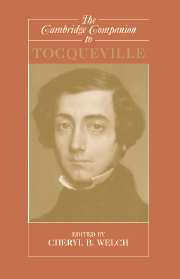Book contents
- Frontmatter
- Introduction: Tocqueville in the Twenty-First Century
- 1 Tocqueville’s Comparative Perspectives
- 2 Tocqueville on 1789: Preconditions, Precipitants, and Triggers
- 3 Tocqueville’s New Political Science
- 4 Tocqueville, Political Philosopher
- 5 Tocqueville’s Democracy in America Reconsidered
- 6 Translating Tocqueville: The Constraints of Classicism
- 7 The Writer Engagé: Tocqueville and Political Rhetoric
- 8 The Shifting Puzzles of Tocqueville’s The Old Regime and the Revolution
- 9 Tocqueville and Civil Society
- 10 Tocqueville on Threats to Liberty in Democracies
- 11 Tocqueville on Democratic Religious Experience
- 12 Tocqueville on Fraternity and Fratricide
- 13 Tocqueville and the French
- 14 Tocqueville and the Americans: Democracy in America as Read in Nineteenth-Century America
- Bibliography
- Index
- Series List
1 - Tocqueville’s Comparative Perspectives
Published online by Cambridge University Press: 28 January 2007
- Frontmatter
- Introduction: Tocqueville in the Twenty-First Century
- 1 Tocqueville’s Comparative Perspectives
- 2 Tocqueville on 1789: Preconditions, Precipitants, and Triggers
- 3 Tocqueville’s New Political Science
- 4 Tocqueville, Political Philosopher
- 5 Tocqueville’s Democracy in America Reconsidered
- 6 Translating Tocqueville: The Constraints of Classicism
- 7 The Writer Engagé: Tocqueville and Political Rhetoric
- 8 The Shifting Puzzles of Tocqueville’s The Old Regime and the Revolution
- 9 Tocqueville and Civil Society
- 10 Tocqueville on Threats to Liberty in Democracies
- 11 Tocqueville on Democratic Religious Experience
- 12 Tocqueville on Fraternity and Fratricide
- 13 Tocqueville and the French
- 14 Tocqueville and the Americans: Democracy in America as Read in Nineteenth-Century America
- Bibliography
- Index
- Series List
Summary
“It was necessary to glance briefly beyond France in order to make sense of what follows; for I dare say that whoever has studied and seen only France, will never understand anything about the French Revolution.” These words, appearing in 1856 in Tocqueville's last published work, were indicative of his perspective about every subject to which he turned his attention. A generation earlier, his attendance at François Guizot's influential course of lectures on the history of civilization was preceded by a long meditation on the lessons of English history. These reflections were formulated in his very first letter to Gustave de Beaumont, who was to be Tocqueville's lifelong friend and traveling companion in America and England.
The quotation from the Old Regime speaks not only of studying but of seeing what one wished to understand, of viewing from without what one wishes to understand within. Tocqueville believed deeply in the importance of personal, even first, impressions. Again and again, the first volume of the Democracy (1835) would frame an observation in personal terms. One had to ''go to America'' to appreciate the extraordinary and pervasive sensations of political and economic activity, of personal mobility and religious belief that pervaded American life.
- Type
- Chapter
- Information
- The Cambridge Companion to Tocqueville , pp. 21 - 48Publisher: Cambridge University PressPrint publication year: 2006
- 3
- Cited by

